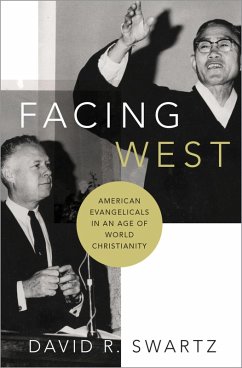
Facing West (eBook, PDF)
American Evangelicals in an Age of World Christianity

PAYBACK Punkte
6 °P sammeln!
In 1974 nearly 3,000 evangelicals from 150 nations met at the Lausanne Congress on World Evangelization. Amidst this cosmopolitan setting - and in front of the most important white evangelical leaders of the United States - members of the Latin American Theological Fraternity spoke out against the American Church. Fiery speeches by Ecuadorian René Padilla and Peruvian Samuel Escobar revealed a global weariness with what they described as an American style of coldly efficient mission wedded to a myopic, right-leaning politics. Their bold critiques electrified Christians from around the world. ...
In 1974 nearly 3,000 evangelicals from 150 nations met at the Lausanne Congress on World Evangelization. Amidst this cosmopolitan setting - and in front of the most important white evangelical leaders of the United States - members of the Latin American Theological Fraternity spoke out against the American Church. Fiery speeches by Ecuadorian René Padilla and Peruvian Samuel Escobar revealed a global weariness with what they described as an American style of coldly efficient mission wedded to a myopic, right-leaning politics. Their bold critiques electrified Christians from around the world. The dramatic growth of Christianity around the world in the last century has shifted the balance of power within the faith away from traditional strongholds in Europe and the United States. To be sure, evangelical populists who voted for Donald Trump have resisted certain global pressures, and Western missionaries have carried Christian Americanism abroad. But the line of influence has also run the other way. David R. Swartz demonstrates that evangelicals in the Global South spoke back to American evangelicals on matters of race, imperialism, theology, sexuality, and social justice. From the left, they pushed for racial egalitarianism, ecumenism, and more substantial development efforts. From the right, they advocated for a conservative sexual ethic grounded in postcolonial logic. As Christian immigration to the United States burgeoned in the wake of the Immigration Act of 1965, global evangelicals forced many American Christians to think more critically about their own assumptions. The United States is just one node of a sprawling global network that includes Korea, India, Switzerland, the Philippines, Guatemala, Uganda, and Thailand. Telling stories of resistance, accommodation, and cooperation, Swartz shows that evangelical networks not only go out to, but also come from, the ends of the earth.
Dieser Download kann aus rechtlichen Gründen nur mit Rechnungsadresse in A, B, BG, CY, CZ, D, DK, EW, E, FIN, F, GR, HR, H, IRL, I, LT, L, LR, M, NL, PL, P, R, S, SLO, SK ausgeliefert werden.













